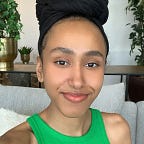On Being a Black and Asian Mixed Race Woman
My mother is a British Black Caribbean woman, and my absent father is a British Asian Pakistani or Iraqi man. When questioned about my ethnicity — a question I frequently received throughout my life — I would respond with, “I’m mixed with Black and Asian,” and reactions would differ from person to person. Some would not believe me whilst others would say, “Oh, you look more Black, you know, have more Black features. So, you’re mainly Black then?” Dealing with the constant erasure of my identity coupled with never meeting my father bred thoughts of inadequacy from an early age and forced me to co-opt a dissembled belief that I was not a ‘true mix’ woman.
Upon reading ‘Mixed/Other: Explorations of Multiraciality in Modern Britain’ by Natalie Morris, I religiously perused chapter five, ‘The “Right Type of Mix” and “Minority Mixes.’’ This was the first time in my twenty-one years of life that I finally felt seen.
Morris writes, “If you’re mixed with two non-white ethnicities, society loses interest. Anything beyond this binary is categorised a ‘other’ and the intricacies and nuances of your heritage are not deemed worthy of wider discussion, or even clear categorisation. Just take a quick look at the options on the [UK] census and ethnicity forms. There are three distinct categories for mixed individuals to tick: white and Black Caribbean, white…
